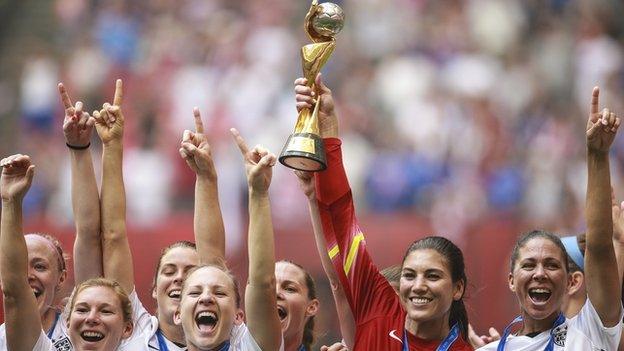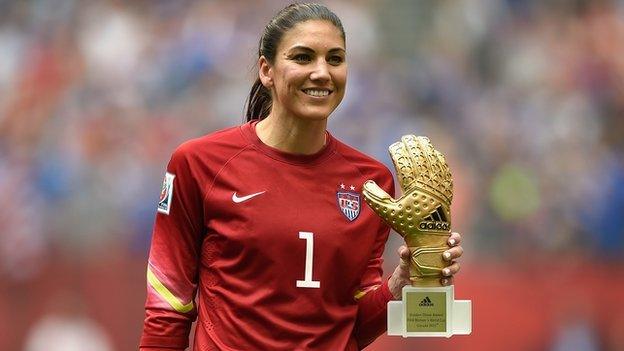Women's World Cup: Fifa 'entrenched in chauvinism' over prize money, says Hope Solo
- Published

Hope Solo lifts the Women's World Cup after the United States' win in 2015
Fifa Women's World Cup |
|---|
Host nation: France Dates: 7 June - 7 July 2019 |
Coverage: Live across BBC TV and Red Button, Radio 5 Live & Sports Extra and the BBC Sport website & App |
United States World Cup winner Hope Solo says that the disparity in prize money at the men's and women's World Cups shows that "male chauvinism is entrenched" in Fifa.
World football's governing body says the £24m awarded to participating teams in 2019 is double the amount of 2015, but £315m was given to teams at the men's 2018 tournament.
Australia's players' union says the difference - which has increased by £21m in the past four years - amounts to "discrimination".
There are 24 teams in the 2019 Women's World Cup while there were 32 in the men's 2018 tournament.
"There is no excuse for that increase in this day and age," former goalkeeper Solo, who is leading a lawsuit against US Soccer over equal pay, told BBC Sport.
"Being honest, it tells me that male chauvinism is entrenched in our global federation and these disparities are a reflection of that.
"We shouldn't have to take these issues to courts and send letters to Fifa."
The Women's World Cup starts in France on Friday,
Fifa says prize money has increased five-fold since the 2007 tournament, and extra payments for teams' preparations has taken its investment to £39m compared to £12m four years ago.
But if comparing prize money at the men's World Cup and women's World Cups, there was a £270m difference for the 2014 and 2015 tournaments, which has increased to £291m for the 2018 and 2019 editions.
Professional Footballers Australia has written to Fifa and started a campaign about the issue.
Fifa's chief women's football officer Sarai Bareman has said: "Prize money for the World Cup teams is only a small part of the investment Fifa is doing for the development of women's football around the world."
Fifa president Gianni Infantino said last year that the prize money for the 2019 tournament was "massively higher than the last World Cup. We are making progress."
Solo, a two-time Olympic champion, was capped 202 times during her 17-year international career and won the World Cup in 2015.
"The state of the game is in a beautiful place because of the talent alone and the commercial dollars being put in, but Fifa remain very chauvinistic when it comes to putting money into the women's game and we really could do a lot better job," she said.

Solo won the Golden Glove for top goalkeeper at the 2015 World Cup
Fifa 'address women's football with a 20-foot pole'
Solo, who will work as a pundit for the BBC during the Women's World Cup, called on other federations to support the Australian union's stance.
"It can't be one federation or one country here and there…. all of the federations should be behind this to further the women's game," she added.
"We need to put in more money from grassroots all the way up to more prize money in the World Cup. Fifa needs to get its hands a little bit wet in terms of addressing these issues and being hands on. Right now, they address the women's game with a 20-foot pole and remain quiet.
"As a soccer family with a worldwide audience, we should be addressing these issues, and not just the women but with men too."
Solo says the battles some women's football players face "break her heart".
Since she and other members of US Soccer challenged their federation about equal pay, she has learned how some players have to negotiate with their federations about whether they pay for internet access in hotels and receive tracksuits.
"Some of the minute things players are fighting for break my heart. We shouldn't be fighting our federations for internet, or players having to pay out of their own pockets," she said.
"I've done my best to reach out to other federations, and we have put our minds together, but we see that male chauvinism is still apparent."